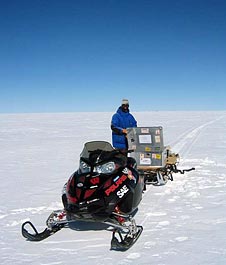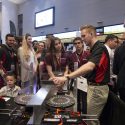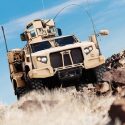Green snowmobile logs first month at Arctic research station
An electric snowmobile built by student members of the University of Wisconsin–Madison College of Engineering Clean Snowmobile Team is now in Greenland, on loan to the National Science Foundation (NSF) for the summer to support climate research projects at the Greenland Environmental Observatory (GEO Summit Camp).

Clean Snowmobile Team co-adviser Ethan Brodsky helps unpack equipment at a field site more than three miles from Summit Camp, Greenland. Wisconsin’s electric snowmobile, on loan for the summer to the National Science Foundation Office of Polar Programs, significantly improves accessibility of these remote sites without contaminating the snow or air.
Photo: Jennie Thomas
Dubbed the Bucky EV, the snowmobile won the zero-emissions category of the Society of Automotive Engineers (SAE) Clean Snowmobile Challenge (CSC) in Houghton, Michigan, earlier this spring. The goal of this event is to promote the development of clean vehicles that can be used in environmentally sensitive areas where a gas-powered vehicle would contaminate air or snow samples. The winning sled each year is invited up to Summit Camp to evaluate its performance in real-world conditions.
Summit Camp is a remote scientific research station situated at the top of the Greenland Ice Sheet. The highest point north of the Arctic Circle, Summit sits atop nearly two miles of ice and is 250 miles from the nearest land. Although conditions there are very inhospitable, with winter temperatures often dropping to minus-76 degrees Fahrenheit and summer temperatures consistently below freezing, Summit Camp is a permanently occupied science facility, maintained by a small crew of five to 10 people in the winter and inhabited by up to 50 staff and researchers in the summer.
The camp is only accessible via aircraft. To avoid polluting the site and tainting measurements, staff have designated certain areas around the camp, “clean snow zones,” where engine-powered vehicles are prohibited. In the past, inhabitants have transported personnel and equipment via cross-country skis and sleds. The 10,000-foot altitude and frigid conditions make this human-powered transportation challenging.
The New York Air National Guard flew the UW–Madison snowmobile up to Greenland on a ski-equipped LC-130 Hercules cargo plane. Assistant team advisor Ethan Brodsky accompanied the vehicle and spent three days at Summit training the camp staff and scientists in operation and maintenance of the sled.
The sled went into service at Summit Camp on June 3 and immediately took up the task of transporting personnel and equipment to some of the remote facilities surrounding the camp. Early experiences in Greenland show that Bucky EV can tow a 1,500-pound payload 5 to 10 miles before needing to recharge. In its first four weeks at Summit, the vehicle has driven 140 miles and transported many tons of cargo, often going through several charging cycles per day. The sled is scheduled to stay for the duration of the summer science campaign, returning to the United States on August 22.
The BuckyEV is powered by Milwaukee Tool lithium-ion batteries coupled to a GM EV1 motor. The system is integrated into a Polaris snowmobile chassis, giving the appearance and feel of a conventional engine-powered snow machine. The vehicle has an unloaded range of almost 20 miles, top speed of 75 mph, and can fully recharge in approximately three hours.
The sled has an on-board data acquisition system that logs every aspect of its operation second by second. Summit Camp staff members download the logs and send them to team members in Wisconsin, allowing continual fine-tuning. This data will aid the team in designing an improved vehicle for the following year’s competition, writing publications describing the development and use of utility snowmobiles in polar research, and writing a proposal to build and sell such vehicles as a university spin-off company.
The Clean Snowmobile Project was funded by the grants from the Brittingham Foundation, the Evjue Foundation, and donations from United Wisconsin Grain Producers (UWGP). Major team sponsors include Milwaukee Electric Tool, Polaris Industries, Delphi, and MotoTron.
Tags: business, engineering, environment, international, student life



